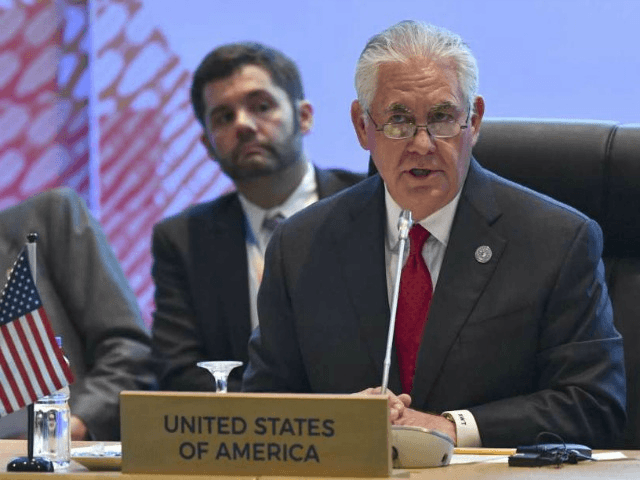The State Department is responding to media inquiries and reports claiming Secretary of State Rex Tillerson has withheld funding for the Global Engagement Center, tasked with the nebulous job of countering terrorist propaganda online.
“Secretary of State Rex Tillerson is resisting the pleas of State Department officials to spend nearly $80 million allocated by Congress for fighting terrorist propaganda and Russian disinformation,” Politico reported on Wednesday.
“It is highly unusual for a Cabinet secretary to turn down money for his department,” Politico reported. “But more than five months into his tenure, Tillerson has not issued a simple request for the money earmarked for the State Department’s Global Engagement Center, $60 million of which is now parked at the Pentagon.”
“Another $19.8 million sits untouched at the State Department as Tillerson’s aides reject calls from career diplomats and members of Congress to put the money to work against America’s adversaries,” Politico reported.
The State Department told Breitbart News that the center is continuing its work and is well-funded.
“The Global Engagement Center continues to execute its mission,” a State Department spokesperson said. “There is a process underway to ensure any future funding or programs account for the most appropriate tactics and strategy—especially in countering propaganda from countries such as Russia that have minimal protections for free speech or the media.”
“The Global Engagement Center is already funded in FY 2017 with $16.3 million,” the spokesperson said.
At the daily press briefing at the State Department on Thursday, a reporter asked Spokeswoman Heather Nauert about the Politico report, suggesting that Tillerson’s motive might be to appease Russia.
“So I have seen that report,” Nauert said. “I want you to know I was just over at the Global Engagement Center a short while ago, and the place is busy.”
“It’s buzzing, people packed in their cubicles working on anti-ISIS propaganda—to counter ISIS propaganda, that is,” Nauert said. “Russia is also an area of interest to them as well.”
“So their work is well underway; their people are busy,” Nauert said. “I met with the head of their program a couple weeks ago to talk about these two very issues.”
“That has not changed,” Nauert said. “They are still operating, hard at work.”
Nauert said Tillerson is a “businessman” who wants money spent “effectively,” but the program is not being eliminated.
Under President Obama, the Global Engagement Center launched a Twitter program called “Think Again, Turn Away” in which State Department employees attempted to shame jihadist propagandists online. At the time, Rita Katz, the head of the SITE Intelligence Group, wrote that the program was “embarrassing” and “counterproductive,” citing the time that the “Think Again, Turn Away” account spent arguing with well-known Twitter jihadists.
On YouTube, the Global Engagement Center attempted to respond to jihadist propaganda by publishing videos depicting the horrors facing an ISIS jihadist who leaves the West with an overly optimistic picture of what jihad will be like.
In January 2016, the Obama Administration was engaged in trying to fix what was described as “a faltering effort.”
“The Obama administration is overhauling its faltering efforts to combat the online propaganda of the Islamic State and other terrorist groups, U.S. officials said, reflecting rising White House frustration with largely ineffective efforts so far to cut into ISIS’s use of social media to draw recruits and incite attacks,” the Washington Post reported at the time.
“Officials will create a counterterrorism task force, which will be based at the Department of Homeland Security but aims to enlist dozens of federal and local agencies,” the Post reported. “Other moves include revamping a State Department program that was created to serve as an information war room to challenge the Islamic State online and erode its appeal.”
“U.S. officials said the unit at the State Department will turn its focus toward helping allies craft more localized anti-terrorism messages and will stop producing any videos or other material in English—ending a campaign that had been derided by critics,” the Post recorded.
According to its website:
The Center plays a key role in countering ISIL’s messaging. Designed to be an agile, innovative organization, the Center uses modern, cutting-edge technology and takes advantage of the best talent and tools throughout the private sector and government.
The Global Engagement Center replaced the Center for Strategic Counterterrorism Communications. The new strategy seeks to be more effective in the information space and is focused on partner-driven messaging and data analytics.
Currently, the Global Engagement Center remains active on Twitter, posting updates on U.S. efforts in the Middle East:

COMMENTS
Please let us know if you're having issues with commenting.